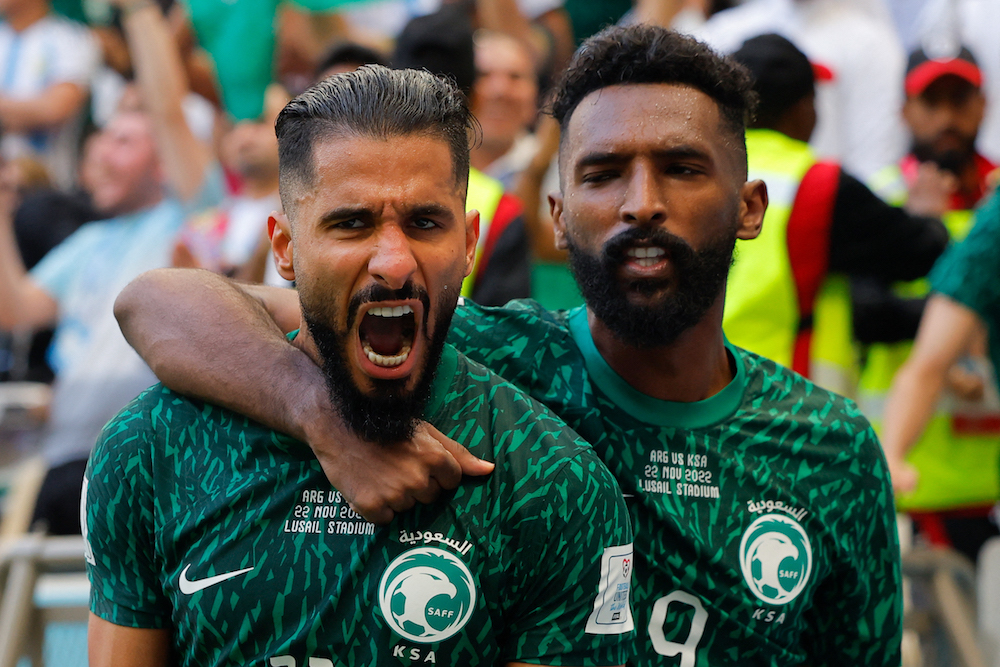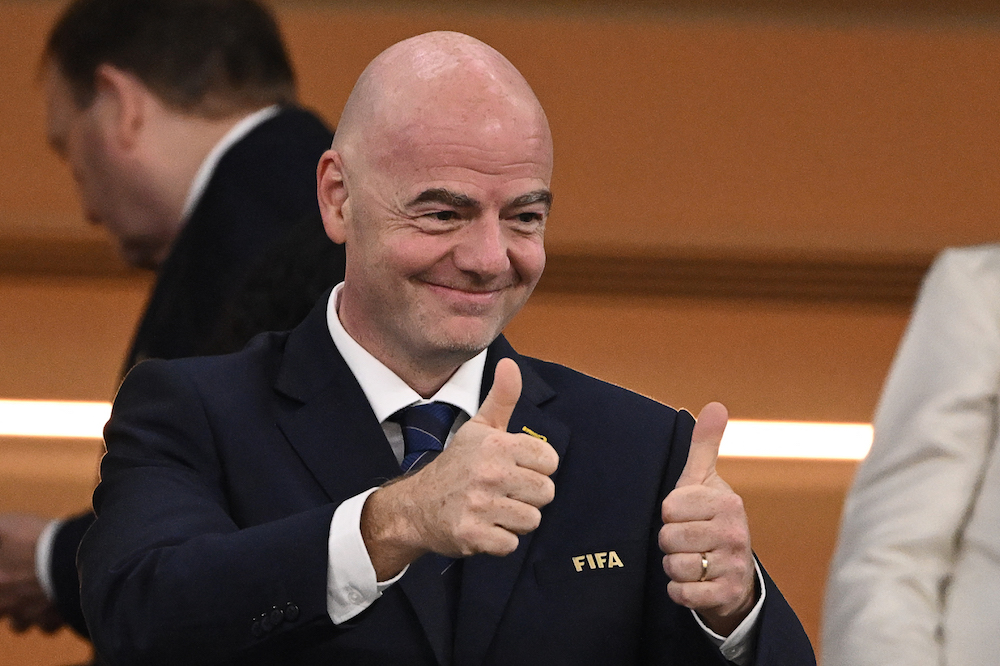SAO PAULO: The World Cup is a big deal in Latin America, with cities across Brazil, Argentina, Mexico and elsewhere brought to a standstill whenever their respective national teams are on the pitch. But for one segment of society in particular, the 2022 tournament hosted by Qatar is particularly significant.
Arab Latin Americans are thought to number about 23 million people. There are large communities in Brazil and Argentina, and significant populations in Mexico, Chile, Venezuela and Colombia, made up of descendants of Arab emigrants who came over from the Middle East and North Africa, voluntarily or as refugees. And, like everybody else in these countries, Arabs love football.
The fact the 2022 World Cup is taking place in an Arab country for the first time provides an even greater incentive for the Arab diaspora in Latin America to tune in from distant time zones. The only question is whether to support the Arab side that reflects their ethnic origins, or the teams of their adopted countries.
Qatar’s hosting of the competition “certainly generates sympathy among Arab communities; people have been waiting for that World Cup for a long time,” Agustin Dib, director of the Arab Culture Club in Buenos Aires, told Arab News.
According to him, however, most Arab Latin Americans tend to root for the team that represents their adopted home.
“In Argentina, the first Lebanese and Syrian immigrants began to arrive at the end of the 19th century,” said Dib. “The same happened in Brazil. So, we are fully Argentinian, Brazilian, and so on — and love our national teams.”
At the same time, though, Arab Latin Americans watch with pride national squads from the Arab world and eagerly follow the fortunes of the likes of Morocco, Saudi Arabia, Tunisia and Qatar. The Saudi team’s historic 2-1 victory against Argentina in their opening match in Qatar no doubt captured the imagination of many.
There are large Arab communities in the border zones between Brazil, Argentina, Uruguay and Paraguay. In these areas, a World Cup campaign can temporarily divide Arab groups.

Saleh Al-Shehri celebrates with Saudi Arabia's forward #09 Firas Al-Buraikan after scoring his team's first goal during the Qatar 2022 World Cup Group C football match between Argentina and Saudi Arabia at the Lusail Stadium. (AFP)
This is certainly the case in the bisected Brazilian city of Chui and its Uruguayan counterpart, Chuy, where several thousand Palestinians have settled. Most of the time, this community pays little heed to the geographical boundary separating them. But a World Cup can change this.
“In general, we cheer for both Uruguay and Brazil,” Jaber Nassar, a 43-year-old shop owner who lives on the Brazilian side of the city, told Arab News. “But if there is a match between both teams, each side will root for its national squad.”
The rest of the time, though, there has traditionally been a historic bond between both communities when it comes to football. In 1987, they founded the Central Palestino Futbol Club. Active for a little more than a decade before folding as a result of lack of funds, Central Palestino was part of the Uruguayan league and made waves in the 1990s when it reached the finals of a national championship.
“I used to see many matches with my mother when I was a boy. Central Palestino was a local champion and we would travel throughout Uruguay to see them play,” said Nassar, whose brother-in-law was part of the squad for several years.
The Palestinian community routinely turns out in force to watch as many matches as possible during a World Cup, said Nassar. A few of his friends even traveled to Qatar for the tournament.
“Of course, we will focus on the Arab teams,” he added.
Nassar said the Palestinians love of South American football is not only a byproduct of immigration. Even in Palestine, he said, many people cheer for Brazil during international tournaments.
FASTFACTS
* The Arab diaspora in Central and South America is thought to number about 23 million people.
* The biggest Arab communities are in Brazil and Argentina, followed by Mexico, Chile, Venezuela and Colombia.
According to Dib, this is common in many Arab nations and reflects a recognition of, and appreciation for, the prowess of top South American players.
“In countries like Syria and Lebanon, people love Argentinian and Brazilian football,” he said. “I lived for a few months in Tunisia and people would always ask me about Maradona and Messi.”
Zuka Khouri, who left Syria as a refugee and settled in the Brazilian city of Curitiba nine years ago, said her family cheers for the Brazilian national team during every World Cup.
“We also liked to see Italy play,” she told Arab News. “This year Italy is not in the competition so we are rooting for Brazil.”
Anas Obaid, a 34-year-old Syrian refugee, was captured and held hostage by an armed group in Syria until his family paid a ransom. After his release, he fled to Lebanon where he worked in a refugee camp in Zahle. He has lived in Brazil since 2015 and is now a journalist and human rights activist. He loves football and said he used to cheer for Argentina when he was a child.
“I was there during the 2014 World Cup, which took place in Brazil,” Obaid told Arab News. “I rooted for Germany, because the country was welcoming many Syrian refugees. But some in the camp rooted for Brazil.”
Since arriving in Sao Paulo, he said has become an ardent supporter of the Brazilian national team. “Brazilians have a passion for football and it is an honor to root for their squad,” he said.
Although football is unequivocally a national obsession in Brazil, and the World Cup a major event for the people there, the number of Brazilian fans who bought tickets for matches in Qatar, 39,546, is significantly lower than the numbers of Argentines (61,083) and Mexicans (91,173).
Mexico regularly sends a large contingent of fans to World Cups. Most Arab Mexicans are of Lebanese origin, according to Hector Chamlati, a member of the consulting board of Centro Libanes, a community association in Mexico City. The number of Lebanese Mexicans is estimated at about 500,000, most of whom are Christians.

FIFA President Gianni Infantino gives thumbs-up during the Qatar 2022 World Cup Group G football match between Brazil and Switzerland at Stadium 974 in Doha. (AFP)
“We have a very strong connection with the Mexican national team,” Chamlati told Arab News. “But it pleases many of us to see Arab teams play. I was glad to see that Tunisia managed to draw with Denmark (on Nov. 22).”
The grandson of Lebanese immigrants, he said the Mexican community feels an intense connection to Lebanon and if the country’s national team was competing in Qatar, many of them would certainly root for them.
“But I think it is special to see the potential success of any Arab squad,” he added.
Jose Alejandro Serio Haddad, a 25-year old Lebanese Mexican, traveled to Qatar with his friends to watch Mexico play. It was his first visit to an Arab country and proved to be something of a culture shock.
“I think Qatari and Lebanese culture are very different,” he told Arab News. “Besides, the number of Arabs here is not very high. Most of the time we meet with South Asians. We feel like foreigners all the time.”
Serio Haddad was not confident about the chances of any Arab teams progressing from the group phase to the final stages of the tournament “but we certainly feel more empathy with them than with Latin American teams, like Argentina, for instance.”
As for the fact that the World Cup is being hosted by a Muslim country for the first time, Obaid said that this was certainly noteworthy but he was unhappy with the amount of criticism that has been leveled against Qatar.
“I am concerned by the international community’s reaction,” he said. “It can be a way of fighting prejudices over Muslims and Arabs. But at the same time people are paying much more attention to Qatar’s social contradictions than they did when the (competition) happened in non-Muslim countries.”
Dib said he has been organizing talks to discuss the common distortions in the way Western countries perceive the World Cup in Qatar.
“Since the first World Cup, in Uruguay in 1930, there have been corruption scandals, for instance,” he said. “But the media now focuses almost exclusively on Qatar’s problems. It is a matter of prejudice.”
In any other context, Dib said, the global press would have talked about the construction marvels achieved by the hosting country “but given that it is an Arab nation, it only talks about the deaths that occurred during construction.”
He added: “I am not saying those problems are not important but the exclusive focus on them is a problem. It has to do with Orientalism as defined by Edward Said.”
In his 1978 book, “Orientalism,” Said established the term as a critical concept to describe the often contemptuous Western depiction of the East.
Dib said that many Arab Latin Americans are not comfortable with what many perceive as biased coverage of Qatar — which has been echoed in the Latin American media as well — because they feel that “there is an ongoing attack on Arab culture as a whole.”
















